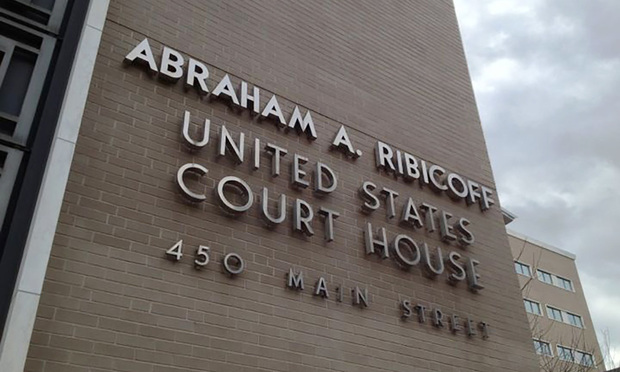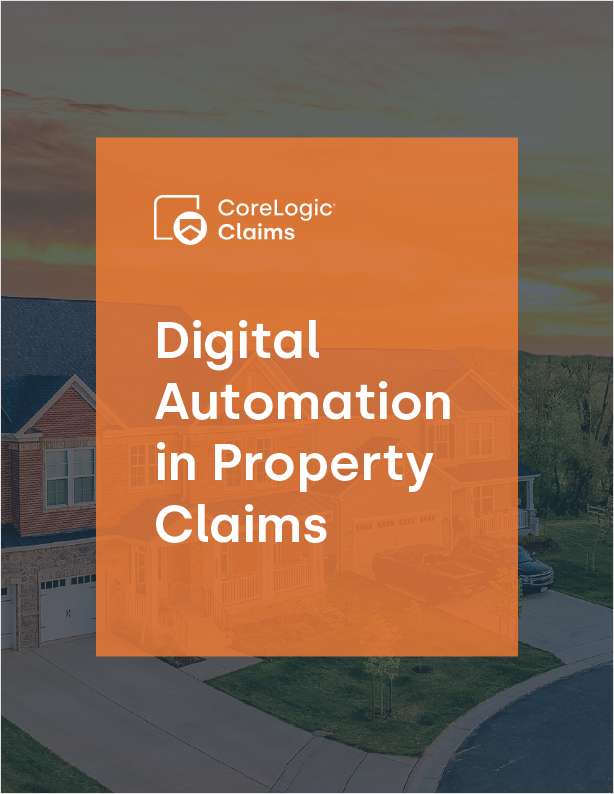Greenwich Man Who Suffered Stroke in Court Sues Judge
Richard Caires, who suffered a stroke in court, has sued an attorney and the judge trial referee claiming his foreclosure case was heard in the wrong jurisdiction. Caires is seeking millions of dollars in damages.
December 01, 2017 at 05:21 PM
7 minute read

A Greenwich man whose home JPMorgan Chase & Co. sought to foreclose on has sued the bank, an attorney and the judge trial referee claiming he suffered a stroke in court because the proceedings against him were intentionally sent to the wrong jurisdiction.
Richard Caires, who is proceeding pro se, said in a 29-page lawsuit filed in U.S. District Court in Hartford that the stress of possibly losing his home caused him to have a stroke in August. The lawsuit claims Superior Court Judge Trial Referee Taggart D. Adams held Caires against “his will under threat and duress of losing his house … when he knew or should have reasonably known that he did not have subject matter jurisdiction, and that egregious abuse of authority caused plaintiff's stroke.”
Caires, who declined to comment Friday, claims in the suit that he suffered irreparable damages to his health and reputation “as a direct proximate result of defendant judge to assume jurisdiction when he did not have it, at the behest of Brian Rich.” Rich, an attorney with Halloran & Sage, did not respond to a request for comment Friday.
In his suit. Caires, quoting case law, wrote: “When a judge acts outside of the scope of his authority, his immunity is purged and he is liable for damages under the Civil Rights Act.” As of Friday, the defendants had not retained counsel.
Caires is seeking actual damages of $10.7 million for the “value of our property interests in the fraudulent foreclosure proceedings instigated by defendant.” In addition, he's seeking compensatory damages of $1 million for “fraudulent conveyance of property interest, intentional interference of person and property”; accumulative damages of $1 million; and punitive and exemplary damages of $1 million.
In addition, Caires is asking the federal court for a preliminary and permanent restraining order and injunction preventing the defendants from taking any further action against his home, including but not limited to garnishment, detainer action, receivership of rents or ejectment.
The property in question was most recently appraised at $6.5 million. The claimed debt is in excess of $8.2 million, according to court papers.
In his Oct. 4 memorandum of decision regarding a motion for continuance, Adams wrote that the case “has travelled several times between the Connecticut Superior Court and federal court.” Adams said: “In hindsight, this court erred in proceeding on Aug. 2 in light of Caires' notice of removal of the case dated that day to the Connecticut federal district court.”
Adams also wrote in his three-page memorandum of decision that U.S. District Judge Janet Hall wrote that Caires “had engaged in a troubling pattern of filing meritless notices of removal on the eve of the state court trial.”
The case was assigned to U.S. District Judge Alvin Thompson in Hartford.
Caires' suit includes four counts: deprivation of rights under the color of law pursuant to the U.S. Code; refusal or neglect to prevent the deprivation of plaintiff's constitutionally protected rights; abuse of process; and a declaratory judgment providing injunctive relief.

A Greenwich man whose home
Richard Caires, who is proceeding pro se, said in a 29-page lawsuit filed in U.S. District Court in Hartford that the stress of possibly losing his home caused him to have a stroke in August. The lawsuit claims Superior Court Judge Trial Referee Taggart D. Adams held Caires against “his will under threat and duress of losing his house … when he knew or should have reasonably known that he did not have subject matter jurisdiction, and that egregious abuse of authority caused plaintiff's stroke.”
Caires, who declined to comment Friday, claims in the suit that he suffered irreparable damages to his health and reputation “as a direct proximate result of defendant judge to assume jurisdiction when he did not have it, at the behest of Brian Rich.” Rich, an attorney with
In his suit. Caires, quoting case law, wrote: “When a judge acts outside of the scope of his authority, his immunity is purged and he is liable for damages under the Civil Rights Act.” As of Friday, the defendants had not retained counsel.
Caires is seeking actual damages of $10.7 million for the “value of our property interests in the fraudulent foreclosure proceedings instigated by defendant.” In addition, he's seeking compensatory damages of $1 million for “fraudulent conveyance of property interest, intentional interference of person and property”; accumulative damages of $1 million; and punitive and exemplary damages of $1 million.
In addition, Caires is asking the federal court for a preliminary and permanent restraining order and injunction preventing the defendants from taking any further action against his home, including but not limited to garnishment, detainer action, receivership of rents or ejectment.
The property in question was most recently appraised at $6.5 million. The claimed debt is in excess of $8.2 million, according to court papers.
In his Oct. 4 memorandum of decision regarding a motion for continuance, Adams wrote that the case “has travelled several times between the Connecticut Superior Court and federal court.” Adams said: “In hindsight, this court erred in proceeding on Aug. 2 in light of Caires' notice of removal of the case dated that day to the Connecticut federal district court.”
Adams also wrote in his three-page memorandum of decision that U.S. District Judge Janet Hall wrote that Caires “had engaged in a troubling pattern of filing meritless notices of removal on the eve of the state court trial.”
The case was assigned to U.S. District Judge Alvin Thompson in Hartford.
Caires' suit includes four counts: deprivation of rights under the color of law pursuant to the U.S. Code; refusal or neglect to prevent the deprivation of plaintiff's constitutionally protected rights; abuse of process; and a declaratory judgment providing injunctive relief.
This content has been archived. It is available through our partners, LexisNexis® and Bloomberg Law.
To view this content, please continue to their sites.
Not a Lexis Subscriber?
Subscribe Now
Not a Bloomberg Law Subscriber?
Subscribe Now
NOT FOR REPRINT
© 2025 ALM Global, LLC, All Rights Reserved. Request academic re-use from www.copyright.com. All other uses, submit a request to [email protected]. For more information visit Asset & Logo Licensing.
You Might Like
View All
Trump's DOJ Delays Releasing Jan. 6 FBI Agents List Under Consent Order
3 minute read
Judge Grills DOJ on Trump’s Birthright Citizenship Executive Order

Justice 'Weaponization Working Group' Will Examine Officials Who Investigated Trump, US AG Bondi Says

Trending Stories
- 1'Translate Across Disciplines': Paul Hastings’ New Tech Transactions Leader
- 2Milbank’s Revenue and Profits Surge Following Demand Increases Across the Board
- 3Fourth Quarter Growth in Demand and Worked Rates Coincided with Countercyclical Dip, New Report Indicates
- 4Public Notices/Calendars
- 5Monday Newspaper
Who Got The Work
J. Brugh Lower of Gibbons has entered an appearance for industrial equipment supplier Devco Corporation in a pending trademark infringement lawsuit. The suit, accusing the defendant of selling knock-off Graco products, was filed Dec. 18 in New Jersey District Court by Rivkin Radler on behalf of Graco Inc. and Graco Minnesota. The case, assigned to U.S. District Judge Zahid N. Quraishi, is 3:24-cv-11294, Graco Inc. et al v. Devco Corporation.
Who Got The Work
Rebecca Maller-Stein and Kent A. Yalowitz of Arnold & Porter Kaye Scholer have entered their appearances for Hanaco Venture Capital and its executives, Lior Prosor and David Frankel, in a pending securities lawsuit. The action, filed on Dec. 24 in New York Southern District Court by Zell, Aron & Co. on behalf of Goldeneye Advisors, accuses the defendants of negligently and fraudulently managing the plaintiff's $1 million investment. The case, assigned to U.S. District Judge Vernon S. Broderick, is 1:24-cv-09918, Goldeneye Advisors, LLC v. Hanaco Venture Capital, Ltd. et al.
Who Got The Work
Attorneys from A&O Shearman has stepped in as defense counsel for Toronto-Dominion Bank and other defendants in a pending securities class action. The suit, filed Dec. 11 in New York Southern District Court by Bleichmar Fonti & Auld, accuses the defendants of concealing the bank's 'pervasive' deficiencies in regards to its compliance with the Bank Secrecy Act and the quality of its anti-money laundering controls. The case, assigned to U.S. District Judge Arun Subramanian, is 1:24-cv-09445, Gonzalez v. The Toronto-Dominion Bank et al.
Who Got The Work
Crown Castle International, a Pennsylvania company providing shared communications infrastructure, has turned to Luke D. Wolf of Gordon Rees Scully Mansukhani to fend off a pending breach-of-contract lawsuit. The court action, filed Nov. 25 in Michigan Eastern District Court by Hooper Hathaway PC on behalf of The Town Residences LLC, accuses Crown Castle of failing to transfer approximately $30,000 in utility payments from T-Mobile in breach of a roof-top lease and assignment agreement. The case, assigned to U.S. District Judge Susan K. Declercq, is 2:24-cv-13131, The Town Residences LLC v. T-Mobile US, Inc. et al.
Who Got The Work
Wilfred P. Coronato and Daniel M. Schwartz of McCarter & English have stepped in as defense counsel to Electrolux Home Products Inc. in a pending product liability lawsuit. The court action, filed Nov. 26 in New York Eastern District Court by Poulos Lopiccolo PC and Nagel Rice LLP on behalf of David Stern, alleges that the defendant's refrigerators’ drawers and shelving repeatedly break and fall apart within months after purchase. The case, assigned to U.S. District Judge Joan M. Azrack, is 2:24-cv-08204, Stern v. Electrolux Home Products, Inc.
Featured Firms
Law Offices of Gary Martin Hays & Associates, P.C.
(470) 294-1674
Law Offices of Mark E. Salomone
(857) 444-6468
Smith & Hassler
(713) 739-1250










